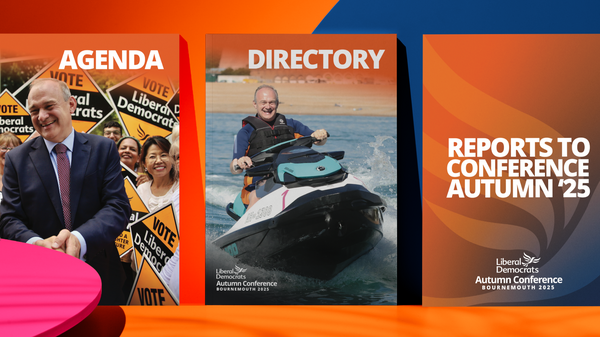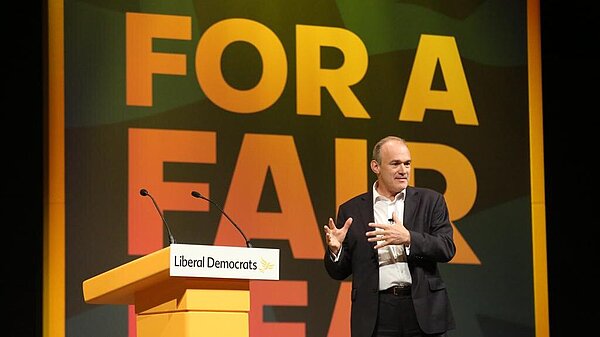A New Hope for the Space Industry
F42 - Policy Motion
Motion as passed by conference
Conference notes:
- The importance of the UK space industry to the economy, security, science, technology, exploration, and culture.
- The importance of the UK’s universities, which leverage and extend the impact of research and innovation in the space industry ensuring a skilled workforce fit for the future.
- That space infrastructure underpins essential services such as navigation, communication, weather, climate monitoring, secure assets, and defence.
- The role that the UK plays in both the research and development of new technologies and the supply chain within the global space industry.
- Public investment in space yields high economic returns, supporting advanced manufacturing and delivering a strong multiplier effect.
- Space technologies, particularly Earth Observation, are crucial in addressing the climate emergency.
- The space sector aligns with the Liberal Democrat manifesto commitment to harnessing new technologies for the public good.
- UK investments in spaceports in Scotland and Cornwall position the nation as Europe's leading destination for commercial space launches, with significant global potential.
- The global leadership of UK universities like the University of Surrey’s Space Centre, in the development and commercialisation of small satellite technology.
- The positive impact of industry-academic clusters, such as Space South Central – led by the universities of Portsmouth, Southampton and Surrey, supporting regional growth and innovation in the UK’s space sector.
- Space technology bolsters UK leadership in science, communications, and cyber security, ensuring protection of critical assets, infrastructure, and data.
Conference believes that:
- The UK risks falling behind global competitors such as the US, China, and Russia, as well as European nations, in space capabilities. Brexit has heightened the need for independent satellite infrastructure, given exclusion from EU initiatives like Galileo. The potential economic loss from GNSS failure is estimated at £5.2 billion over five days.
- Independent UK launch capabilities are vital for fulfilling security and defence needs.
- SKYNET, a UK Ministry of Defence programme providing strategic satellite communication services to the UK Armed Forces and allies, is crucial to national security.
- The UK's strengths in advanced technologies such as 5G, AI, IoT, and quantum computing are synergistic with space investment, benefiting businesses and citizens.
- Cleaning up ‘Space Junk’, or Active Debris Removal (ADR), is of growing importance to the space industry, and UK-based companies should play a leading role in supporting ADR.
- International collaboration in space, particularly through the European Space Agency (ESA), is an invaluable platform for shared missions and innovation.
- Public engagement, exemplified by Tim Peake’s mission, inspires the next generation in STEM, enhancing the UK’s science and technology workforce.
- Government, universities, colleges, schools and industry have a key role in collaborating to address current and future skills needs and enthuse the next generation of space engineers, entrepreneurs and explorers.
Conference calls for:
- The UK Government to immediately review and renew the 2021 National Space Strategy, with the central focus of incentivising international investment, fostering industry growth and academic collaboration, and people–centred, efficient regulation.
- Government to conduct a review of private spaceport initiatives in Scotland, Cornwall, hubs like the Harwell Science and Innovation Campus and other locations, leveraging regional clusters such as Space South Central to ensure continued attention is paid to establishing the UK as a global space hub.
- The UK Government to designate the space industry as a ‘strategic industry’ for the purpose of the National Wealth Fund’s investment, paving the way for productive investment in areas including:
- Pooled sovereign satellite navigation capacity by rejoining fully the Galileo system, confirm IRIS2 participation, and explore associated EU security programmes and initiatives.
- Quantum communications, satellites, advanced materials, optical infrastructure, and computing to secure UK leadership in emerging technologies.
- Efforts to establish guidance and schemes for industry to better support inclusion for underrepresented groups, in particular people with disabilities, women and ethnic minorities, mimicking and building on schemes like the Women in Finance Charter (HM Treasury) and the Business in the Community Race at Work Charter (Department for Business and Trade).
- The UK Government to reverse its decision to absorb the UK Space Agency into the Department for Science, Innovation and Technology by April 2026, and maintain the independent status of UKSA which was designed to present a unified interface with ESA and other national space agencies and which provides the specialised focus, technical expertise, and international credibility essential for competing in the global space economy.
- Further consolidation all government space activity in a single body, especially space functions currently sitting in other government departments; and confirmation that this body will be responsible for delivery, policy, strategy and regulation.
Applicability: Federal.
Amendments
Amendment One
PASSED
Submitted by: 10 members
Mover: Zöe Franklin MP
Summation: Guy Palmer
After I. (line 3), insert:
II. The importance of the UK’s universities, which leverage and extend the impact of research and innovation in the space industry ensuring a skilled workforce fit for the future.
After VII. (line 20), insert:
VIII. The global leadership of UK universities like the University of Surrey’s Space Centre, in the development and commercialisation of small satellite technology.
IX. The positive impact of industry-academic clusters, such as Space South Central – led by the universities of Portsmouth, Southampton and Surrey, supporting regional growth and innovation in the UK’s space sector.
After G. (line 47), insert:
H. Government, universities, colleges, schools and industry have a key role in collaborating to address current and future skills needs and enthuse the next generation of space engineers, entrepreneurs and explorers.
In 1. (line 51), after ‘industry growth’ insert ‘...and academic collaboration…’.
In 2. (line 55), after ‘other locations’ insert ‘..., leveraging regional clusters such as Space South Central…’
Amendment Two
PASSED
Submitted by: LibSTEMM
Mover: Lord Clement-Jones (Lords Spokesperson for Science and Innovation)
Summation: Chris Lomax
Delete 3. a) (lines 61-63) and insert:
a) Pooled sovereign satellite navigation capacity by rejoining fully the Galileo system, confirm IRIS2 participation, and explore associated EU security programmes and initiatives.
After 4. (line 72), add:
5. The UK Government to reverse its decision to absorb the UK Space Agency into the Department for Science, Innovation and Technology by April 2026, and maintain the independent status of UKSA which was designed to present a unified interface with ESA and other national space agencies and which provides the specialised focus, technical expertise, and international credibility essential for competing in the global space economy.
6. Further consolidation all government space activity in a single body, especially space functions currently sitting in other government departments; and confirmation that this body will be responsible for delivery, policy, strategy and regulation.



